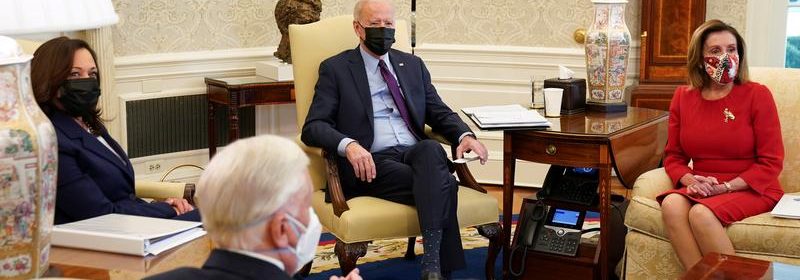White House unites around simple message: Spend now to save the economy

WASHINGTON (Reuters) – After lackluster jobs data showed the U.S. labor market recovery is stalling, President Joe Biden and his economic team on Friday hammered home the same message in meetings, interviews and television appearances: It’s time to put more money into the economy.
Meeting with top Democrats from the U.S. House of Representatives at the White House, Biden said the United States would not return to full employment at the current pace of job creation for 10 years, underscoring the need for lawmakers to act on his $1.9 trillion pandemic-related aid proposal.
“Our economy is still in trouble,” Biden told reporters after the meeting. “Some in Congress think we did enough – others think we can do little or nothing – that’s not what I see.”
Biden’s stimulus proposal, which would come on top of about $4 trillion in aid passed by Congress last year, has met resistance mostly from Republican lawmakers who have expressed concerns about the swelling national debt.
But the Democratic president pushed back on Friday, saying what Republicans have proposed instead would not deliver enough help to the economy.
“It’s people’s lives. Real-life people are hurting and we can fix it,” Biden said earlier. “When we help them we are also helping our competitive capacity,” he said.
Biden also urged lawmakers to avoid the risk of agreeing on a stimulus package that was too small to meet the urgent needs of the American people, millions of whom remain without jobs nearly a year after the onset of the COVID-19 pandemic.
Related Coverage
The Democratic-controlled House passed a budget outline on Friday that will allow Biden’s relief package to go through Congress without Republican support in the coming weeks. The Senate, which is evenly split between the two parties, approved it in a pre-dawn vote, with Vice President Kamala Harris casting the tie-breaking vote.
COSTS OF INACTION
Biden’s top economic advisers also pushed for more government aid on Friday, stressing the need to reach women, low-wage workers and minorities who are disproportionately affected by job losses. The U.S. economy is still about 10 million jobs short of where it was before the pandemic.
“The idea that we should pare back now, out of a future fear that maybe we might possibly do too much, just doesn’t seem consistent with the economic evidence we have in front of us,” Heather Boushey, a member of the White House’s Council of Economic Advisers, said in an interview with Reuters. “The cost of inaction far outweighs the costs of perhaps doing a little bit too much.”
U.S. employment growth rebounded less than expected in January, with only 49,000 positions added, and job losses in December were worse than initially thought.
Jared Bernstein, who is also a member of the Council of Economic Advisers, said in a news briefing at the White House that the price tag for Biden’s rescue plan was not too big.
“Today’s (employment) report is yet another reminder that our economy is still climbing out of a hole deeper than that of the Great Recession and needs additional relief,” Bernstein said after noting that the pandemic has led to a rise in long-term unemployment and that women and people of color were disproportionately affected by job losses.
With pandemic-related unemployment benefits set to expire on March 14, further action by Congress is needed soon, he said.
Treasury Secretary Janet Yellen and Harris are scheduled to take part in a virtual discussion with members of the Black Chambers of Commerce to discuss the president’s rescue plan at 3 p.m. EST (2000 GMT).
Source: Read Full Article
